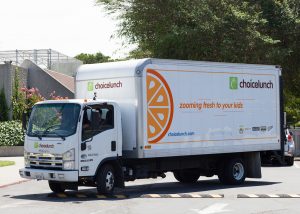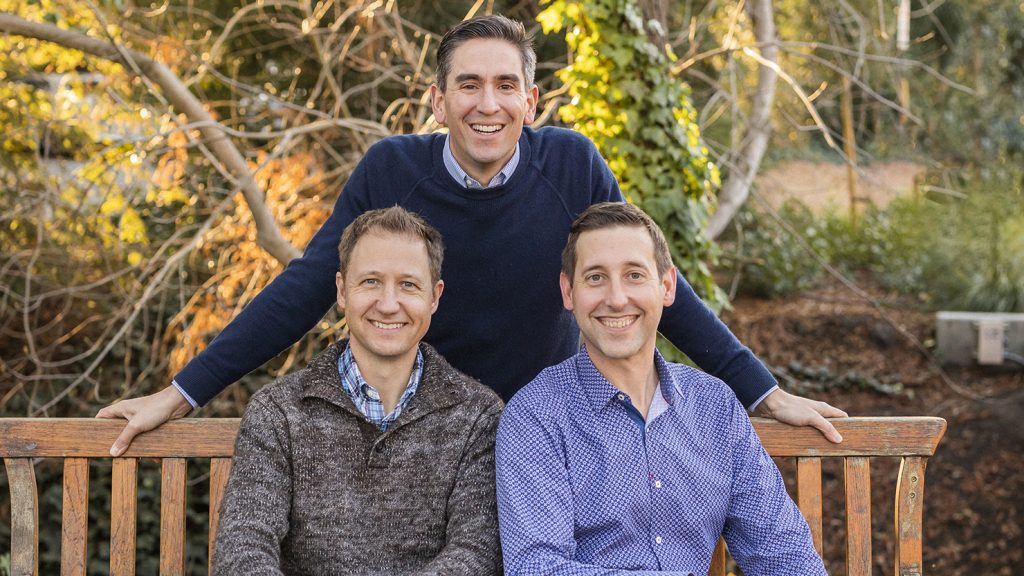When the COVID-19 pandemic led schools to close, the day-to-day operations at Choicelunch, a healthy school lunch delivery service, paused.
Choicelunch, established in 2003 by three University of Notre Dame alums, provided lunches for 25,000 children at 300 schools statewide before schools closed.
"Instead of 25,000 lunches a day, we were making zero lunches a day," said Keith Cosbey, chief operating officer.
The company's five kitchens and the majority of its 200 employees were impacted.
"I was distraught," said Justin Gagnon, Choicelunch co-founder and CEO. "We ended up having to lay off all of our hourly employees, our kitchen staff and our drivers."
Out of the 300 schools that Choicelunch serves, 120 are Catholic schools, according to Cosbey.
He said the Archdiocese of San Francisco was the first client to announce that it would be closing schools for three weeks.
"Of our 300 schools, that was 22 immediately that closed," Cosbey told Catholic News Service.
Within three days, there was a chain reaction of calls from other diocesan clients, including the San Jose and Oakland dioceses and the Los Angeles Archdiocese.
Gagnon said shutting down and laying off employees were difficult, but the reality was without lunches and revenue coming in, Choicelunch wasn't going to sustain itself long term.
Although schools announced three-week closures at the time, Choicelunch was looking at trends, data and the virus' impact overseas. The company expected the school year was going to be cut short.
"We had to figure something out to get some money coming through the door so we could keep some of our people paid and employed and hopefully begin to even bring back a lot of our hourly employees," Gagnon said.
Around that time, Gagnon received several voicemails one day from the Office of Emergency Management of Orange County, California, asking if he was the emergency contact for a particular business. He, however, hadn't heard of the business mentioned.
He googled the business and found that it was located at one of the former Choicelunch kitchens in Huntington Beach, California.
Gagnon called the county representatives back to learn more about what they were seeking. They said they had a homeless shelter and needed to find a way to deliver breakfast, lunch and dinner seven days a week.
Gagnon informed them that Choicelunch kitchen was no longer at that location, but there was one in Santa Ana, California.
"The first thing that came in was the contract with Orange County in doing our homeless meal preparation, and that eventually expanded to three sites," he said.
Choicelunch provides daily meals at two sites in Santa Ana and one site in Fullerton, California, serving about 600 people.

The company sent letters to other Bay Area counties to see if they needed similar services, but there was no response.
Gagnon said in the midst of that, family members were contacting him to see if the company's suppliers had staple foods, like meat, dairy products, fruit and vegetables. Grocery store shelves were bare, and grocery services such as Instacart didn't have any available deliveries.
"We were watching very closely what was happening in retail," Gagnon said.
He, Cosbey and Ryan Mariotti, the company's chief technology officer, exchanged ideas and decided to use the company's kitchen in Danville, California, as a food pantry and drive-through pick-up center. Gagnon said the pantry saved 45 jobs.
Choicelunch partners with about seven or eight food distributors, including Sysco, its mainline distributor. Cosbey said getting food from their suppliers has helped Choicelunch and its distributors.
"The food service world is a completely different supply chain," Cosbey said. "We worked with suppliers that had all of this food being unused with restaurants, hotels, caterers, convention centers and school lunch companies like us all closed."
In addition to the homeless communities in Orange County that receive meals from Choicelunch, other vulnerable populations use the pantry. Gagnon said those with compromised immune systems often come. Cosbey said he has elderly neighbors that also use the pantry.
"They can get their groceries without going into the store and navigating the aisles, and in some cases, navigating the aisles to come away empty," Cosbey said. "With the pantry, people can rely on getting what they need."
Gagnon said despite the recent successes for Choicelunch, the past few months have been an "incredibly emotional time" for him.
The day before the company released 160 of its employees, he wept while watching a movie with his children at home. And then after the pantry was up and running, he had a "near-nervous breakdown" from not having clarity on how things would turn out.
Gagnon called his aunt, who he said is "probably the most faithful woman he's ever known." He vented to her about all of his anxiety, fears and frustrations.
She told Gagnon, "The things that are happening now that you think are working against you will somehow end up being favorable. Not only will God get you through this, but he will also bless you abundantly."
He said looking back on the various trials and setbacks Choicelunch has faced during the pandemic has ultimately allowed him to see other doors open and to celebrate the small wins.
"I'm already seeing those blessings come to fruition," Gagnon said.
He said there's still a great amount of uncertainty moving forward, but he will continue to remain faithful and trust in God.

